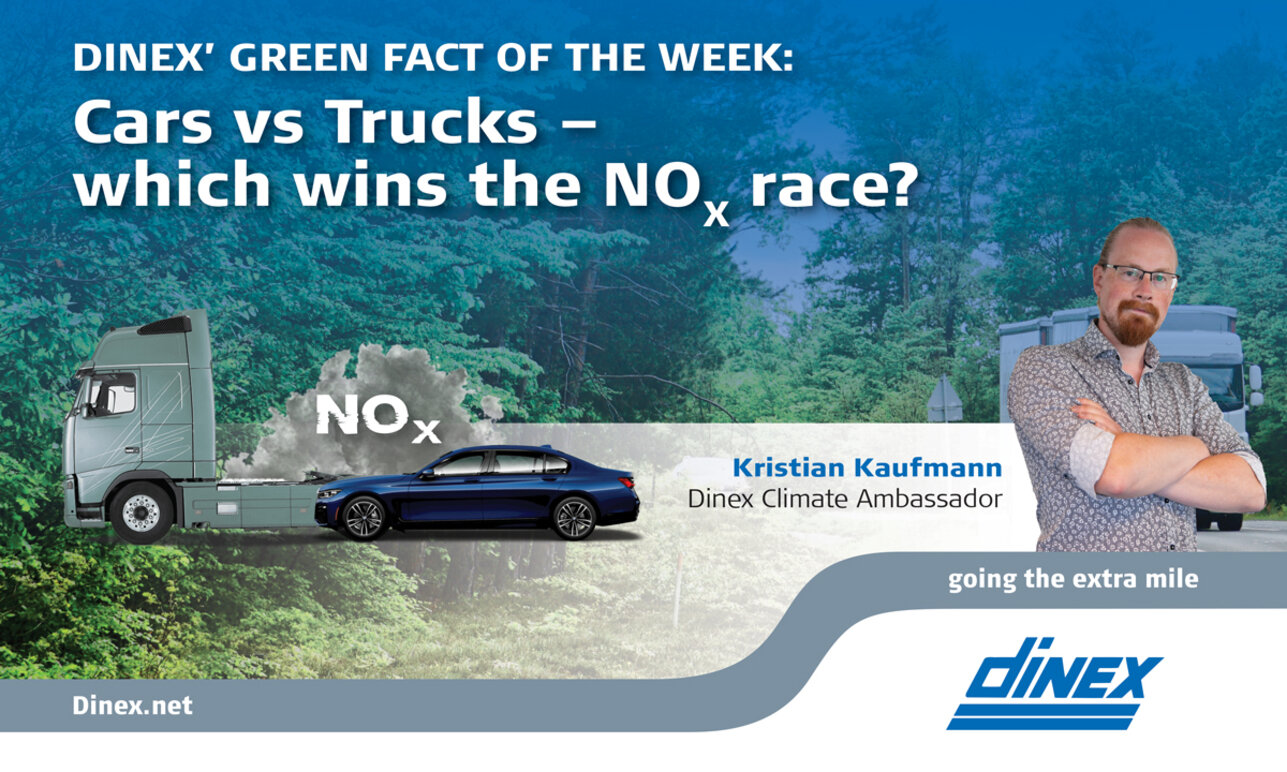- News and Events
- News
- Green Fact of the Week - Cars vs Trucks – which wins the NOx-race

Heavy Duty trucks are in many ways the backbone of society. They haul several tons of goods across continents, and for this they require a lot of energy, they are powered by big engines, and they consume a lot of fuel. Maybe that’s also why trucks has gained the reputation of being environmentally dirty: Especially in terms of emissions of Nitrogen Oxides (NOx) and Particulate Matter.
Thankfully both NOx and Particulates were heavily regulated in Europe with the introduction of Euro 6 for cars in 2014, and for trucks with Euro VI in 2013. But as many remember, the “dieselgate” incidents in 2015 questioned the validity of emission regulations, as it appeared that certain cars were rigged to present compliant results during lab tests, which also drew a lot of public and political attention to the concept of “cycle beating”.
One important but often overlooked difference between the original versions of Euro 6 (for cars) and Euro VI (for trucks & busses), are the test procedures for approval. Where the Euro 6 required all new cars to demonstrate compliance during a standard cycle on a test bench under controlled conditions, Euro VI on the other hand made all new trucks subject also to on-road testing using Portable Emission Measurement Systems (PEMS).
The effect of this difference is remarkable. A paper published in 2017 by ICCT which combined several test results from real world driving, concluded that Euro 6 cars from 2014 emitted more than twice as much NOx as Euro VI Heavy Duty Trucks and Busses!
Diesel cars are permitted to emit up to 80 mg of NOx per km driven, but the ICCT results concluded average real world emissions to be 500 mg/km. Trucks and busses were in comparison measured to emit only 210 mg/km.
NOx emissions can be efficiently reduced from the exhaust gas using Selective Catalytic Reduction (SCR) technology in the aftertreatment system, which has been commonly found on practically all European trucks since 2004, and American trucks since 2010.
At the same time, SCR also reduces fuel consumption (and thereby CO2 emissions), by limiting the engines dependency on Exhaust Gas Recirculation (EGR). For diesel cars however, SCR is only during recent years starting to be common as the Euro 6d (2019) is phasing in the same Real World Driving test requirements as applicable for trucks.
SCR-technology is still being refined, with impressive and innovative concepts being demonstrated by the exhaust aftertreatment industry already, preparing for the upcoming more stringent Euro 7/VII standard. But the are still several millions of pre Euro 6d cars out there on the roads, so coming back to the current score in the NOx race, it seems like trucks has a 6 year head-start over cars.
Dinex' Green Fact of the Week is the title of a series of blog posts by Dinex Climate Ambassador Kristian Kaufmann. The purpose is to use facts and technical arguments to promote the most pragmatic and effective solutions to further reduce the transport industry's climate and environmental impact - for an even cleaner and greener future.

Image courtesy of ICCT